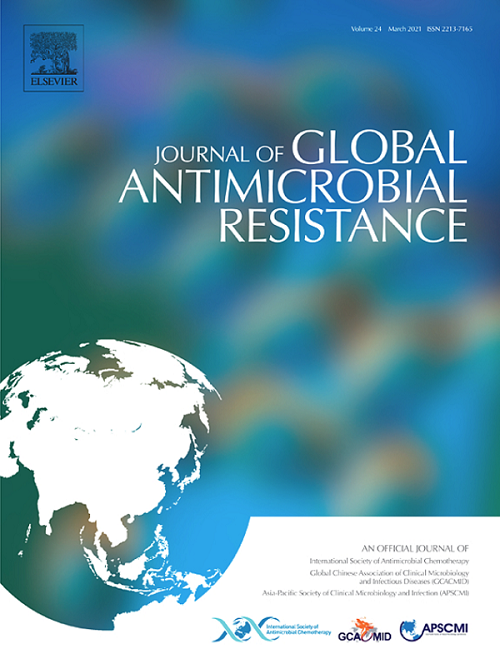外源性硫化氢使产碳青霉烯酶的鲍曼不动杆菌对庆大霉素增敏。
IF 3.2
3区 医学
Q2 INFECTIOUS DISEASES
引用次数: 0
摘要
目的:耐碳青霉烯鲍曼不动杆菌构成重大公共卫生威胁。这些细菌通常表现出广谱抗生素耐药性,使它们对几乎所有种类的抗生素都具有耐药性。硫化氢(H2S)是一种由许多细菌自然产生的化合物,被认为对某些抗生素具有保护作用。然而,鲍曼不动杆菌不产生H2S。方法:为研究外源性H2S对产碳青霉烯酶鲍曼不动杆菌耐药性的影响,在不同条件下进行培养,包括H2S存在或不存在以及庆大霉素、阿奇霉素、环丙沙星、四环素和美罗培南的亚抑制浓度。在多个时间点评估细菌生长以评估生长动态。结果:单独外源H2S对细菌生长的影响有限。然而,它的加入降低了庆大霉素的最低抑制浓度(MIC),并使细菌对这种抗生素的亚抑制浓度敏感。结论:本研究强调了H2S作为抗生素增强剂的潜力,表明使用这种组合可能是治疗鲍曼不动杆菌引起的肺部感染或防止在导管等医疗器械上定植的有希望的策略。本文章由计算机程序翻译,如有差异,请以英文原文为准。
Exogenous hydrogen sulphide sensitizes carbapenemase-producing Acinetobacter baumannii to gentamicin
Objective
Carbapenem-resistant Acinetobacter baumannii pose a major public health threat. These bacteria often display broad-spectrum antibiotic resistance, rendering them resistant to nearly all classes of antibiotics. Hydrogen sulphide (H2S), a compound naturally produced by many bacterial species, has been proposed to exert a protective effect against certain antibiotics. However, A. baumannii does not produced H2S.
Methods
To investigate the effect of exogenous H2S on antibiotic resistance, several clinical isolates of carbapenemase-producing A. baumannii were cultured under various conditions, including the presence or absence of H2S and/or sub-inhibitory concentrations of gentamicin, azithromycin, ciprofloxacin, tetracycline, and meropenem. Bacterial growth was assessed at multiple time points to evaluate growth dynamics.
Results
Exogenous H2S alone had a limited impact on bacterial growth. However, its addition reduced the minimum inhibitory concentration of gentamicin and sensitized the bacteria to sub-inhibitory concentrations of this antibiotic.
Conclusions
This study highlights the potential of H2S as an antibiotic potentiator, suggesting that the use of this combination may be a promising strategy for treating pulmonary infections caused by A. baumannii or for preventing colonization on medical devices such as catheters.
求助全文
通过发布文献求助,成功后即可免费获取论文全文。
去求助
来源期刊

Journal of global antimicrobial resistance
INFECTIOUS DISEASES-PHARMACOLOGY & PHARMACY
CiteScore
8.70
自引率
2.20%
发文量
285
审稿时长
34 weeks
期刊介绍:
The Journal of Global Antimicrobial Resistance (JGAR) is a quarterly online journal run by an international Editorial Board that focuses on the global spread of antibiotic-resistant microbes.
JGAR is a dedicated journal for all professionals working in research, health care, the environment and animal infection control, aiming to track the resistance threat worldwide and provides a single voice devoted to antimicrobial resistance (AMR).
Featuring peer-reviewed and up to date research articles, reviews, short notes and hot topics JGAR covers the key topics related to antibacterial, antiviral, antifungal and antiparasitic resistance.
 求助内容:
求助内容: 应助结果提醒方式:
应助结果提醒方式:


